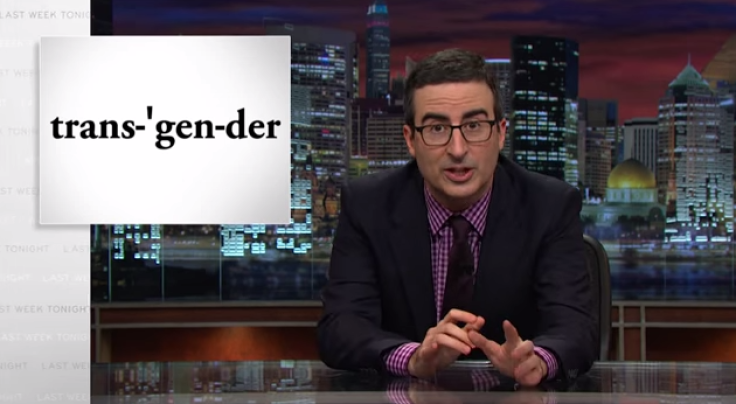John Oliver On Transgender Rights: Despite LGBT Victory, 'We've Got Work To Do'

On Friday, the Supreme Court ruled gay marriage constitutional, marking a historic win for LGBT rights. But despite the sheer happiness in the air and the explosive festivities that went on this weekend, with many cheering “Love Wins,” there is still plenty of work to do.
John Oliver placed the spotlight specifically on transgender people on Sunday, pointing out discouraging statistics about the way transgender people are treated poorly in America. They’re more likely to commit suicide, be harassed both sexually and physically, and have a difficult time getting through daily activities or bureaucratic processes like getting a driver’s license, for example. And a lot of that stems from ignorance among fellow Americans.
“While a handful of transgender people have been winning awards or appearing on magazine covers, the community at large has been facing some staggering challenges,” Oliver said. Indeed, transgender celebrities like Laverne Cox and Caitlyn Jenner have made significant steps forward for the entire transgender community, but the average transgender person must still face bullying, prejudice, and many times hate on a daily basis.
To prove his point, Oliver shows clips of several conservative news outlets (such as Fox) in which anchors are asking transgender people about their genitalia. “It is no more OK to ask transgender people about their sex organs than it would be to ask Jimmy Carter whether or not he’s circumcised,” Oliver retorts.
Prejudice is often a result of ignorance, especially among people who don’t personally know any transgender people. So Oliver explains what it means exactly to be transgender: a person who doesn't conform to conventional definitions of gender, and identifies with a gender they weren’t necessarily born with (i.e. a man who identifies as a woman — like Chelsea Manning or Caitlyn Jenner — and who should be addressed as such). They may or may not get sex changes or hormonal therapy, but as Oliver says, it’s not really any of your business. Sexual orientation, meanwhile, is who you want to be with, and that shouldn’t matter either.
There are some 700,000 transgender people living in America — almost as much as the population of Boston, Oliver notes — and treating them with respect and civil rights should be a priority.
“We’ve clearly got work to do, because when you’re transgender pretty much every interaction with bureaucracy can be humiliatingly difficult,” Oliver says.



























